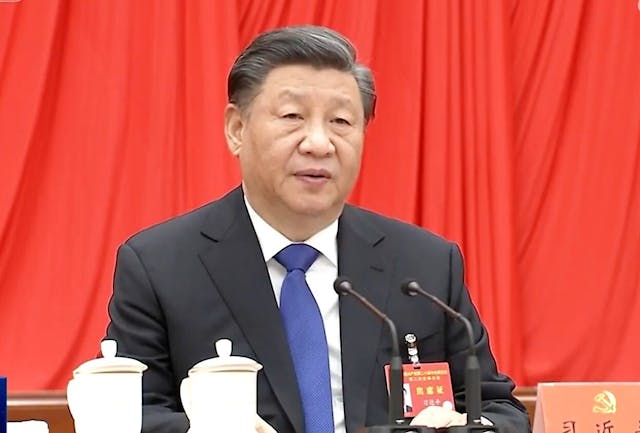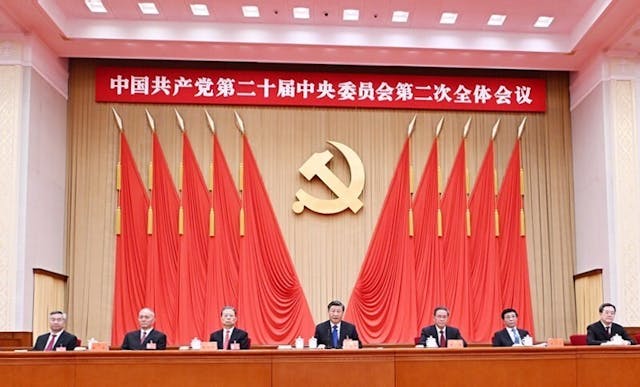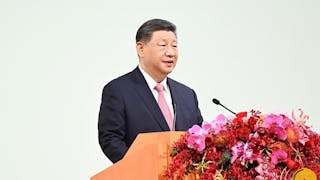2月26日至28日在北京召開的中國共產黨第二十屆中央委員會第二次全體會議審議通過的《黨和國家機構改革方案》,對中國的黨政機關改革和領導層更替的動態關係具有重要意義。
出席這次全會的有中央委員203人,候補中央委員170人。中央紀律檢查委員會副書記和有關部門負責人列席了這次會議。全會由中央政治局主持。中央委員會總書記習近平作了重要講話。全會通過了《黨和國家機構改革方案》。
全會聽取和討論了中央政治局的工作報告,最重要的是,審議通過了中央政治局提出的擬向十四屆全國人大一次會議推薦的國家機構領導人選建議名單,以及擬向全國政協十四屆一次會議推薦的全國政協領導人選建議名單,並決定將這兩份建議名單分別向十四屆全國人大一次會議主席團和全國政協十四屆一次會議主席團推薦。
貫徹落實二十大精神和決策
全會肯定了黨的二十屆一中全會以來中央政治局的工作。一致認為,面對嚴峻複雜的國際環境,中央政治局全面貫徹黨的二十大精神。具體來說,是高舉中國特色社會主義旗幟,全面貫徹習近平新時代中國特色社會主義思想。這兩句關鍵的話表明剛召開的全國政協和全國人大「兩會」將貫徹習近平新時代中國特色社會主義思想。同時,中國將調整新冠疫情防控措施,推動經濟穩步回升;保障和改善民生,維護國家安全和社會穩定。
會議確定宣傳貫徹黨的二十大精神,悼念已故中共總書記江澤民,促進高質量發展,紮實推進「民主法治建設和宣傳思想文化工作」,保障和改善民生,維護國家安全和社會穩定,開啟「中國特色大國外交」新征程。另一方面,要深化從嚴治黨,進一步深化改革步伐。
換言之,就是要求全國人大、全國政協貫徹落實中共二十大精神和決策,包括反腐倡廉、振興經濟、維護國家安全和社會穩定、防患於未然,包括新冠疫情或其他傳染病的發生。在以中國特色的「大國外交」處理對外關係的同時,穩定仍是壓倒一切的口號。
基本上,政治機關,特別是全國人大和全國政協,必須貫徹中共二十大精神和決定──這是中國共產黨領導下中國政治的延續,尤其是在習近平時代。
全會強調了動員各族人民實現建設社會主義現代化國家和推進中華民族偉大復興的願景的重要性──中共二十大上強調了這兩個願景。

完善治理體制 提高運行效率
最有意思的是,會議通過了黨和國家機關在加強領導、協調中共中央機關、全國人大、國務院轄下各機關、全國政協和中央與地方關係方面的改革方案。要求黨的領導在機構設置上更加「科學」;在職能配置上更加優化;在體制機制上更加完善;在運行管理上更加高效。
這裏很明顯,全國人大可望表決通過改革方案,並通過適當的立法進一步實施方案,而國務院的國家機關也將進行改革、精簡和優化組織協調,以實現行政更加高效。
習近平總書記在講話中強調,中共二十大對深化黨和國家機構改革作出重要部署,在深化金融體制改革,完善黨中央對科技工作統一領導的體制,優化政府職責體系和組織結構,完善黨中央決策議事協調機構,優化機構編制資源配置,推進以黨建引領基層治理,加強混合所有制企業、非公有制企業黨建工作,理順行業協會、學會、商會黨建工作管理體制等方面提出明確要求。
這即是說,黨的組織工作將進一步深入基層群眾組織和非國有企業。 顯然,儘管混合所有制仍然存在,但中國共產黨及其領導作用在社會和經濟各個層面都將得到加強。此外,黨在金融、貨幣和科學領域的領導需要得到加強──這是中國共產黨未來幾年的戰略領域和規劃。 最後,中國共產黨必須更好地組織和監督利益集團。總的來說,在各項體制改革中可以看到強化黨領導的味道。
如果說機構改革是強化黨的領導和建設,以及把組織協調好,那麼領導層換屆和換人,就要看接下來的全國人大和全國政協會議,領導班子的更新換屆將在兩會完成。
在中國的政治生活中,機構改革不僅涉及提高行政效率和加強官員協調,還涉及加強黨的領導作用。加強黨的領導必須通過人事變動、更新和恢復組織活力來解決。簡言之,機構改革、黨的領導和人事變動和更新交織在一起──這是已召開的全國人大和政協會議的一個特點。
港澳辦或變直屬中央
一個很好的例子是中央對與港澳關係的機構改革和更換領導層。 據報道,部長級的國務院港澳辦,可能變為直屬中央的中共中央港澳辦公室。
港媒對此有兩種解讀; 一是港澳辦的「地位」可能「升格」為中共中央直屬;二是黨對國家機關的管控和協調將加強。
第一種解釋可能誤解了中央對香港的最高決策機構。自2003年7月1日香港特別行政區發生遊行示威以後,中共成立了中央港澳工作協調小組,以應對香港特區的政局不穩。一些香港傳媒可能忘記了,這個協調小組的成員包括中聯辦、港澳辦、國安、公安、貿易和商務等部門的官員。據香港傳媒報道,協調小組工作至2020年2月,似乎更名為中央港澳工作領導小組。如果港澳辦主任長期以來一直是領導小組的主要成員,那麼說港澳辦似乎通過設立這個「新」的中共中央港澳辦公室來提高「地位」,就有點牽強了。
第二種解釋,即加強黨的監督和與港澳辦的協調,似乎更有說服力。因為此舉符合通過《黨和國家機構改革方案》,該方案旨在加強黨的領導和與國家機關的協調──環環相扣的黨國關係是中國政治的特色。

領導層將有人事變動
領導層人事變動方面,據悉,隨着譚耀宗逐漸淡出政壇,辭去港區全國人大常委職務,接替他的人選可能包括立法會前議員馬逢國、 民建聯主席李慧琼,以及工聯會會長吳秋北。3位經驗豐富的政壇人物來自不同界別:來自文藝界的馬逢國、來自在統戰工作中扮演重要角色的愛國政黨成員李慧琼,以及來自工人階級背景的吳秋北。
我們觀察另一個可能的人事變動,是70歲的港澳辦主任夏寶龍是否會被更年輕的官員取代。據報道,夏寶龍可能繼續擔任港澳辦主任,部分原因是中聯辦主任剛剛換上60歲的鄭雁雄。不過,鑑於內地有不少經驗豐富的官員,夏寶龍退下來是早晚的事。
第三個值得我們關注的職位是中央港澳工作領導小組組長韓正。據悉,王滬寧或丁薛祥兩位政治局常委將有機會接替韓正。傳言韓正可能出任國家副主席的職位。如果王滬寧接替韓正,不僅要處理香港一國兩制的發展,還要處理台灣一國兩制方案的設計,這將是一項艱鉅的任務和挑戰。 如果丁薛祥換替韓正,或許有助減輕王滬寧的工作負擔。畢竟,丁薛祥在2022年7月陪同國家主席習近平訪問香港,當時已有報道預測,丁薛祥或接替韓正成為處理港澳事務的主要官員。
然而,無論誰接替韓正,都將有同樣的安排,因為黨和中央政府對香港和澳門的政策,從最近的二十大開始就已經確定了。預計香港和澳門都將維護國家安全,發展經濟(澳門發展多元化經濟),並與大灣區更緊密地融合,重點發展科技和吸引內地人才,為兩地的經濟和科學發展作出貢獻。
港澳辦、黨中央協作更緊密
總而言之,中共二十屆二中全會通過的《黨和國家機構改革方案》,已經為中國的機構改革、領導層改組和黨國整合,包括中央與港澳的關係奠定了基礎。港澳辦一如既往,將通過「新」的中共中央港澳辦公室向黨中央匯報。港澳辦與黨中央的協作將更加緊密,港區全國人大常委將煥發活力。同樣,負責港澳事務的中央級官員也可能會有所調整,特別是中共中央港澳辦公室的負責人。 無論誰接替中央對港澳事務的領導,可以預見的是,黨的二十大關於港澳事務的精神和決策將得到延續。簡而言之,領導層更迭的連續性很可能是全國人大和政協會議的特點。機構改革、領導層更新和黨國整合,以及加強協調將成為正在舉行的全國人大和全國政協會議的標誌。
China’s Institutional Reform and Leadership Change
The “Reform Blueprint of the Party and State Organs” that was approved by the second meeting of the 20th Central Committee of the Communist Party of China (CPC) from February 26 to 28 in Beijing has important implications for the dynamic relations between institutional reform and leadership change in China.
The meeting witnessed the participation of 203 Central Committee members and 170 supplementary members, including the observers from the Central Discipline Inspection Committee (CDIC) and other government departments. The meeting was presided over by the Politburo of the Central Committee. The Central Committee’s party secretary Xi Jinping delivered an “important” speech and the meeting approved the “Reform Blueprint of the Party and State Organs.”
The meeting listened to the work report of the Central Committee’s Politburo and, most importantly, it deliberated two proposed name lists of the leading personnel of the state organs and of the National Chinese People’s Political Consultative Conference (CPPCC). The two name lists are submitted to the first meeting of the Presidium of the 14th National People’s Congress (NPC) and to the first meeting of the Presidium of the 14th CPPCC.
The meeting affirmed the work of the Central Committee’s Politburo since the first Plenum of the 20th Party Congress. The consensus was that the Politburo implemented the spirit of the 20th Party Congress in face of the complex and serious international circumstances. Specifically, the banner of the Chinese-style socialism has been raised, while the Chinese-style socialist thought in the Xi Jinping new era has been “comprehensively implemented” – key phrases showing that the upcoming NPC and CPPCC meetings are expected to implement the spirit of Chinese socialism and socialist thought. Moreover, China persists in coordinating the prevention of infectious disease and in developing the economic, social and security spheres.
The meeting affirms the importance of studying and publicizing the spirit of the 20th Party Congress, remembering solemnly the late comrade Jiang Zemin, promoting high quality development, stably pushing forward the work of “democratic and rule of law construction and the propaganda of cultural thought and work.” The objectives are to protect and improve the people’s livelihood, safeguard national security and social stability, and to initiate a new journey of “great power diplomacy with Chinese characteristics.” On the other hand, the Party has to be governed strictly and reform work has to be deepened further.
Reading between the lines above, the NPC and CPPCC are required to implement the spirit and decisions of the 20th Party Congress, including the fight against corruption, the revival of the economy, the maintenance of security and stability, and the prevention of any eruption and occurrence of Covid-19 or other infectious diseases. Stability remains the catchword, while Chinese-style “great power diplomacy” is adopted by China to deal with its foreign relations.
Basically, political institutions, notably the NPC and CPPCC, have to implement the spirit and decisions of the 20th Party Congress – a continuity in Chinese politics under the leadership of the CPC especially during the Xi Jinping era.
The meeting emphasizes the importance of mobilizing all ethnic groups and peoples to realize the visions of building up socialist modernization and promoting Chinese renaissance – two visions that were stressed in the 20th Party Congress.
Most interestingly, the meeting approves the reform blueprint of the Party and state organs in the direction of strengthening leadership, coordinating the Party’s central organs, the NPC, the state organs under the State Council, the CPPCC and the relations between the centre and local regions. Leadership will have to be more “scientific;” institutional reforms will have to be deepened and strategically focused; the functions of state organs can be perfected; institutional mechanisms need to be improved; and managerial operation has to be more efficient.
Here, it is obvious that the NPC is expected to adopt the reform blueprint and implement it further with appropriate legislation, while state organs under the State Council are going to be reformed, streamlined and better coordinated for the sake of achieving administrative efficiency.
Party-secretary Xi Jinping’s speech highlighted several points: the need to deepen monetary and financial institutional reforms, the need to improve the Party leadership of the scientific work, the requirement of improving the coordinating mechanisms of the Party centre’s decisions, the need to reform the establishment and resources allocation of state organs, the need to promote Party-led management at the basic level, the need to strengthen the mixed ownership system, the need to consolidate Party work in non-public enterprises, and the need to deal with the demands from occupational sectors, academic associations and business organizations for Party construction work.
Reading between the lines above, the CPC organizational work is going to be consolidated in people’s organizations at the grassroots level and in non-state-owned enterprises. Obviously, the role of the CPC and its leadership are going to be enhanced at all levels of the society and economy, albeit a mixed economic system persists. Moreover, the Party leadership needs to be improved in the financial, monetary and scientific fields – strategic areas and planning for the CPC in the coming years. Finally, interest groups have to be better organized and supervised by the CPC. Overall, the taste of a stronger Party can be seen amid various institutional reforms.
If institutional reforms are going to be characterized by a stronger Party and its better organization as well as coordination, then leadership change and renewal are going to be followed up by the upcoming NPC and CPPCC meetings, during which we will expect personnel renewal and leadership reshuffle.
In Chinese politics, institutional reforms are enmeshed in not only the enhancement of administrative efficiency and better bureaucratic coordination, but also the strengthening role of the Party leadership. This strengthened Party leadership will have to be addressed by personnel change, renewal and rejuvenation. In short, institutional reforms, Party leadership and personnel change and renewal are intertwined – a hallmark in the upcoming NPC and CPPCC meetings.
A good example is the institutional reform and leadership change with regard to the Party-state’s relations with Hong Kong. The ministerial-level Hong Kong and Macau Affairs Office (HKMAO) is reportedly going to have its reporting line strengthened to the Central Committee’s Central Hong Kong and Macau Coordination Work Office.
There are two interpretations in the Hong Kong media over this move. One is that the “status” of the HKMAO may be “elevated” to the central level of the Party. The second one is the Party has better control over and better coordination with the state organs.
The first interpretation arguably misunderstands the Party-state’s top policy-making structures on Hong Kong since the July 1, 2003 protests in the Hong Kong Special Administrative region (HKSAR). After the mass protests, the CPC set up a Central Hong Kong and Macau Coordination Leading Small Group to deal with the political turbulence in the HKSAR. Some Hong Kong media might have forgotten that members of this Leading Small Group included officials from the Liaison Office, the HKMAO, national security, public security, trade and commerce. It has been working until, according to the Hong Kong media, February 2020 when the Group appeared to change its name to the Hong Kong and Macau Coordination Work Office. If HKMAO director has long been a key member of the Leading Small Group, then it is a bit far-fetched to argue that the HKMAO appears to have its “status” enhanced by having this “new” Coordination Work Office.
The second interpretation on stronger Party supervision and coordination with the HKMAO appears to be more convincing, because this move is in line with the approval of the Reform Blueprint of Party and State Organs, which aims at strengthening Party leadership and its coordination with state organs – an interlocking Party-state relationship that is the hallmark of Chinese politics.
On leadership change, it is reported that with Tam Yiu-chung’s gradual retirement from politics and stepping down from his position as a Hong Kong member of the Standing Committee of the NPC, other contenders replacing him may include former legislator Ma Fung-kwok, the chairwoman of the Democratic Progressive Alliance for Betterment and Progress of Hong Kong (DAB) Starry Lee, and chairman of Federation of Trade Unions Ng Chau-pei. The three experienced politicians come from different sectors: Ma from the arts and cultural sector, Lee from the patriotic political party that plays a crucial role in united front work, and Ng from the working-class background.
Another possible personnel change for our observation is whether the 70-year-old HKMAO Director Xia Baolong would be replaced by a younger official. It is reported that Xia may stay on as the HKMAO Director partly because the Liaison Office Director has just been changed to the 60-year-old Zheng Yanxiong. However, given the presence of many experienced mainland officials, Xia’s stepping down will soon be a matter of time.
The third position that deserves our observation is Han Zheng, who chairs the Coordination Small Group or the Coordination Work Committee on Hong Kong and Macau. It is reported that Wang Huning or Ding Xuexiang, two top members of the Politburo Standing Committee, would have the chances of replacing Han, who according to rumour would likely move to the position of Vice President. If Wang takes up Han Zheng’s position, he would deal with not only the development of “one country, two systems” in Hong Kong but also the design of the Taiwan model of “one country, two systems” – a gigantic task and challenge to him. If Ding replaces Han, this move would perhaps help alleviate the work burden on Wang Huning. After all, Ding accompanied President Xi Jinping’s visit to Hong Kong in July 2022 and there were already reports at that time predicting Ding’s takeover from Han Zheng as the leading official dealing with Hong Kong and Macau matters.
Whoever will take over from Han Zheng, however, will have the same arrangements, because the central government and Party’s policies on Hong Kong and Macau have already been decided since the recent 20th Party Congress. Both Hong Kong and Macau are expected to protect national security, develop their economy (economic diversification in the Macau case), and to integrate closer with the Greater Bay Area with foci on the development of science and technology and the attraction of mainland talents, who would contribute to the economic and scientific development of the two SARs.
In conclusion, the “Reform Blueprint of the Party and State Organs” approved by the second meeting of the 20th Central Committee CPC has already laid the groundwork for institutional reforms, leadership reshuffle and Party-state consolidation in China, including the central relations with Hong Kong and Macau. The HKMAO, as in the past, will report to the Party central through the “new” coordination work office. The HKMAO will have stronger coordination with the Party centre, while the Hong Kong members of the NPC Standing Committee will be rejuvenated. Similarly, the central-level officials responsible for Hong Kong and Macau matters will likely be adjusted, notably the head of the Coordination Work Office. Regardless of who will take over from the central leadership on Hong Kong and Macau affairs, it can be expected that the spirit and decisions of the 20th Party Congress on Hong Kong and Macau are going to continue. In short, continuities amid leadership changes will likely characterize the NPC and CPPCC meetings. Institutional reforms, leadership renewal and Party-state consolidation as well as stronger coordination are going to be the hallmarks of the upcoming NPC and CPPCC sessions.
原刊於澳門新聞通訊社(MNA)網站,本社獲作者授權轉載。原文網址:https://www.macaubusiness.com/opinion-chinas-institutional-reform-and-leadership-change/



































